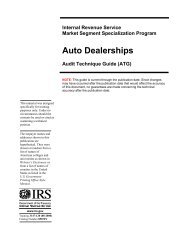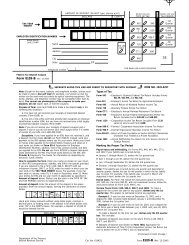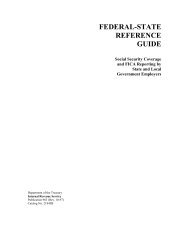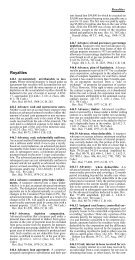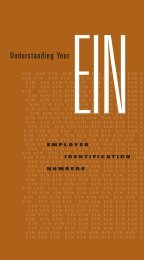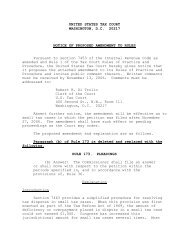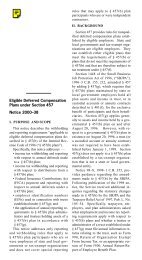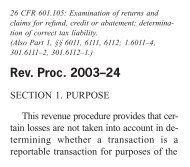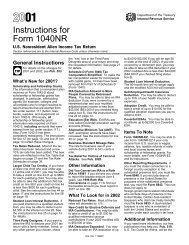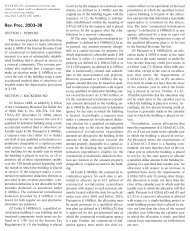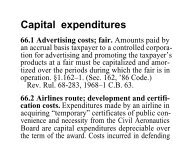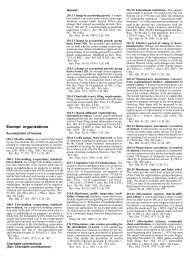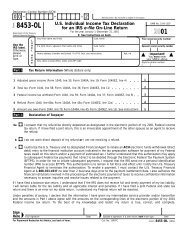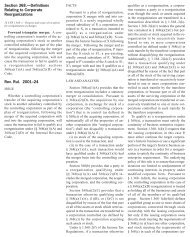Exemptions (Personal and dependency) - Uncle Fed's Tax*Board
Exemptions (Personal and dependency) - Uncle Fed's Tax*Board
Exemptions (Personal and dependency) - Uncle Fed's Tax*Board
You also want an ePaper? Increase the reach of your titles
YUMPU automatically turns print PDFs into web optimized ePapers that Google loves.
<strong>Exemptions</strong> (<strong>Personal</strong> <strong>and</strong><br />
<strong>dependency</strong>)<br />
222.1 Adopted child. Under the adoption statutes<br />
of Maryl<strong>and</strong> <strong>and</strong> Virginia, a child is “legally<br />
adopted” for the purpose of the exemption for<br />
dependents when the interlocutory decree of<br />
adoption is entered. Under the adoption statutes of<br />
Missouri, a child is not “legally adopted” until the<br />
decree of adoption is entered, there being no provision<br />
for an interlocutory decree. §39.25–2. (Sec.<br />
25, ’39 Code; Sec. 151, ’86 Code.)<br />
Rev. Rul. 54-70, 1954-1 C.B. 69.<br />
222.2 Adopted child; foreign born. A child,<br />
born in a foreign country to a nonresident alien<br />
mother <strong>and</strong> whose father is a member of the U.S.<br />
Armed Forces, who is adopted by another member<br />
of the Armed Forces <strong>and</strong> his wife, qualifies as a<br />
dependent of such adoptive parents. §39.25-2.<br />
(Sec. 25, ’39 Code; Sec. 151, ’86 Code.)<br />
Rev. Rul. 55-413, 1955-1 C.B. 323.<br />
222.3 Aliens; residents <strong>and</strong> nonresidents;<br />
multiple support agreement. A resident alien<br />
may not claim a <strong>dependency</strong> exemption for a child<br />
who is a citizen-resident of a country contiguous<br />
to the U.S. in a situation where the basis for the<br />
exemption is a multiple support agreement<br />
between the resident alien <strong>and</strong> nonresident aliens<br />
who are not engaged in a trade or business within<br />
the U.S. §§1.151–2, 1.152–3, 1.873–1. (Secs. 151,<br />
152, 873; ’86 Code.)<br />
Rev. Rul. 82-183, 1982-2 C.B. 54.<br />
222.4 Aliens; Vietnamese refugees. A taxpayer<br />
who sponsors an unrelated Vietnamese refugee<br />
family by providing housing <strong>and</strong> financial<br />
support is not entitled to claim <strong>dependency</strong><br />
exemptions for the refugee family members who<br />
are members of the taxpayer’s household for less<br />
than the entire taxable year. §§1.151–1, 1.152-1.<br />
(Secs. 151, 152; ’86 Code.)<br />
Rev. Rul. 76-35, 1976-1 C.B. 44.<br />
222.5 Aliens; wife <strong>and</strong> child. A nonresident<br />
alien engaged in a trade or business within the U.<br />
S. whose status changed to resident alien during<br />
the year is entitled to exemptions for his wife <strong>and</strong><br />
dependent child not to exceed his taxable income<br />
for the period he was a resident alien. He may not<br />
determine any of his tax liability for that year<br />
under section 3. I.T. 3926 superseded. 1.151-1.<br />
(Sec. 151, ’86 Code.)<br />
Rev. Rul. 73-62, 1973-1 C.B. 56.<br />
222.6 Blind persons; vision correctable only<br />
with special contact lenses. An individual whose<br />
vision could be corrected to exceed 20/200 only by<br />
use of special contact lenses that could be worn<br />
only for brief periods of time was entitled to an<br />
exemption for blindness. (Sec. 25(b), ’39 Code;<br />
Sec. 151, ’86 Code.)<br />
Emanuel Hollman, 38 T.C. 251, Acq., 1964-2<br />
C.B. 5.<br />
222.7 Child alive only momentarily. Expenses<br />
incurred to induce an abortion do not qualify under<br />
section 152 as an item of support for a child born<br />
alive during the tax year. Rev. Rul. 73–156 clarified.<br />
§1.152-1. (Sec. 152, ’86 Code.)<br />
Rev. Rul. 85-118, 1985-2 C.B. 59.<br />
222.8 Child alive only momentarily. Parents<br />
may claim a <strong>dependency</strong> exemption for a child<br />
born alive during the taxable year, even though the<br />
child lived only momentarily, providing applicable<br />
State or local law recognizes the child’s life<br />
<strong>and</strong> there is official documentation of its life.<br />
§1.152-1. (Sec. 152, ’86 Code.)<br />
Rev. Rul. 73-156, 1973-1 C.B. 58.<br />
222.9 Child born in foreign country; mother<br />
nonresident alien; father U.S. citizen. A child<br />
born in a foreign country, whose mother is a nonresident<br />
alien <strong>and</strong> whose father is a U.S. citizen has<br />
a dual citizenship, <strong>and</strong> should be treated as a U.S.<br />
citizen in the administration of U.S. law. Therefore,<br />
the child qualifies as a dependent under section<br />
152(a). I.T. 3848 superseded. §1.152–2. (Sec.<br />
152, ’86 Code.)<br />
Rev. Rul. 71-44, 1971-1 C.B. 49.<br />
222.10 Child in school for mentally retarded;<br />
State aid. Financial assistance provided by a State<br />
toward room, board, <strong>and</strong> tuition for a child in a<br />
school for the mentally retarded is not considered<br />
in determining support of a dependent; amounts<br />
paid by the taxpayer are deductible medical<br />
expenses. §§1.151–2, 1.213–1. (Secs. 151, 213;<br />
’86 Code.)<br />
Rev. Rul. 71–347, 1971–2 C.B. 114.<br />
222.11 Children of divorced parents; lodging<br />
in jointly owned residence. Taxpayer <strong>and</strong> her exhusb<strong>and</strong><br />
each claimed a <strong>dependency</strong> exemption<br />
for their child who lived with the tax payer in a residence<br />
stiptdated by the decree of divorce to be held<br />
for the use <strong>and</strong> benefit of the taxpayer, although<br />
legal title remained in both parents. Held, lodging<br />
support does not depend on the legal interest in a<br />
residence; taxpayer, having the sole right to possession<br />
<strong>and</strong> occupancy of the house, was entitled<br />
to the exemption. (Sec. 152, ’86 Code.)<br />
Jewel T. Brumer, 39 T.C. 534, Acq., 1964-1 (Part<br />
1) C.B. 4.<br />
222.12 Children of divorced parents; payment<br />
in arrears. A taxpayer required by court<br />
order to pay $2,400 per year for child support paid<br />
$1,700 in 1962 <strong>and</strong> was $480 in arrears for prior<br />
years. The wife was unemployed <strong>and</strong> furnished
none of the prior years’ support. Held, the payments<br />
in 1962 could not be reduced by the amount<br />
of arrerages; the taxpayer was entitled to claim<br />
the exemptions. (Sec. 152, ’86 Code.)<br />
Frank P. Gajda, 44 T.C. 783, Acq., 1966-1 C.B.<br />
2.<br />
222.13 Children of divorced parents; payments<br />
in arrears. Payments made by a divorced<br />
husb<strong>and</strong>, who fails to pay “child support” for a<br />
calendar year, but pays the arrearage in a subsequent<br />
year, is not child support furnished either for<br />
the year such payments were in arrears or the year<br />
the arrearage was paid, but is reimbursement to the<br />
divorced wife for child support furnished by her<br />
during the period such payments were in arrears.<br />
§39.25-2. (Sec. 25, ’39 Code; Sec. 151, ’86 Code.)<br />
Rev. Rul. 220, 1953-2 C.B. 22.<br />
222.14 Children of divorced parents; support.<br />
A divorced husb<strong>and</strong> who contributes over<br />
$1200 toward his child’s support is entitled to a<br />
<strong>dependency</strong> exemption where the custodial wife<br />
<strong>and</strong> her mother together provided over half the<br />
support <strong>and</strong> no multiple support agreement was<br />
filed. (Sec. 152, ’86 Code.)<br />
Rev. Rul. 71-22, 1971-1 C.B. 43.<br />
222.15 Children of divorced parents; support;<br />
agreement. A written child <strong>dependency</strong><br />
agreement between divorced parents executed<br />
after the taxable year in which child support payments<br />
were made by the noncustodial parent but<br />
within the statutory period for filing a claim for<br />
refund meets the requirements of section<br />
152(e)(2)(A)(i). (Sec. 152, ’86 Code.)<br />
Rev. Rul. 70-73, 1970-1 C.B. 29.<br />
222.16 Children of divorced parents; support;<br />
lodging. Two minor children lived with their<br />
mother in a house jointly owned by the parents,<br />
who were separated <strong>and</strong> later divorced without<br />
making provision for disposition or use of the<br />
jointly-owned house. Held, in determining which<br />
parent furnished over half the support of the two<br />
children, the item of lodging is considered furnished<br />
half by each parent. (Sec. 152, ’86 Code.)<br />
Eva L. Lindberg, 46 T.C. 243, Acq., 1967-2<br />
C.B. 2.<br />
222.17 Children of divorced parents; support<br />
payments deposited in account; medical<br />
expenses. A divorced taxpayer, not having custody<br />
of the children of a former marriage but<br />
entitled to claim the children as dependents, may<br />
deduct the medical expenses of the children paid<br />
by the taxpayer’s former spouse from a special<br />
account established for the support money provided<br />
by the taxpayer for the children. §§1.152-4,<br />
1.213-1. (Secs. 152, 213; ’86 Code.)<br />
Rev. Rul. 76-344, 1976-2 C.B. 82.<br />
222.18 Children of divorced parents; support<br />
payments deposited in educational fund. A noncustodial,<br />
divorced parent making child support<br />
payments of $1,200 constituting more than onehalf<br />
the child’s support is entitled to the <strong>dependency</strong><br />
exemption, even though the payments are<br />
deposited in a special educational fund by the parent<br />
having custody. I.T. 3883 superseded. (Secs.<br />
151, 152; ’86 Code.)<br />
Rev. Rul. 71-43, 1971-1 C.B. 44.<br />
222.19 Children of divorced parents; support<br />
provided by custodial parent <strong>and</strong> new spouse.<br />
A remarried custodial parent may include the support<br />
provided by the new spouse to determine<br />
which of the divorced parents is entitled to the<br />
<strong>dependency</strong> exemption for their child. Rev. Rul.<br />
71-19 revoked; amplified by Rev. Rul. 78-91.<br />
§§1.151-2, 1.152-4, 301.780-1. (Secs. 151, 152,<br />
7805; ’86 Code.)<br />
Rev. Rul. 73-175, 1973-1 C.B. 58.<br />
222.20 Children of divorced parents; support<br />
provided by custodial parent’s new spouse.<br />
Support provided for the children of divorced parents<br />
by the custodial parent’s new spouse will be<br />
attributed to the custodial parent in determining<br />
whether the divorced parents contributed over half<br />
the children’s support during the calendar year. If<br />
the divorced parents together provided over half<br />
the support, the noncustodial parent will be<br />
entitled to the <strong>dependency</strong> exemptions if a decree<br />
of divorce or written agreement so provides <strong>and</strong><br />
the noncustodial parent contributed at least $600<br />
for the support of each child for the year. Rev. Rul.<br />
73–175 amplified. §§1.151-2, 1.152-4. (Secs.<br />
151, 152; ’86 Code.)<br />
Rev. Rul. 78-91, 1978-1 C.B. 36.<br />
222.21 Dual status Canadian citizen; nondiscrimination<br />
clause. The nondiscrimination<br />
clause of Paragraph 11 of the Protocol to the U.S.-<br />
Canada Income Tax Convention, as amended, providing<br />
in effect, that citizens of Canada residing in<br />
the U.S. may not be subjected t omore burdensome<br />
taxes than U.S. citizens, does not prevent the U.S.<br />
from denying a Canadian citizen who is both a resident<br />
<strong>and</strong> nonresident of the U.S. during the taxable<br />
year the benefits of using the head of household<br />
tax rate schedules, optional tax tables,<br />
st<strong>and</strong>ard deduction, or joint return. §§1.1-1,<br />
1.2-2, 1.4-1, 1.142-2, 1.6013-1. (Secs. 1, 2, 4,<br />
142, 6013; ’86 Code.)<br />
Rev. Rul. 74-239, 1974-1 C.B. 372.<br />
222.22 Exchange students. German students<br />
brought to the U.S. under the International Educational<br />
Exchange Service <strong>and</strong> placed in American<br />
homes for a temporary period of one year are not<br />
residents of the U.S. <strong>and</strong> may not be included in<br />
the term dependent. (Sec. 152, ’86 Code.)<br />
Rev. Rul. 55-653, 1955-2 C.B. 38.<br />
222.23 Foster parent. A <strong>dependency</strong> exemption<br />
may be taken by a taxpayer for his foster parent<br />
who owns the house in which he <strong>and</strong> the taxpayer<br />
live if the statutory requirements are met.<br />
§§1.151-1, 1.152-1. (Secs. 151, 152; ’86 Code.)<br />
Rev. Rul. 64-41, 1964-1 (Part 1) C.B. 84.<br />
222.24 Foster parents. Factual situations illustrate<br />
the tax treatment of amounts received <strong>and</strong><br />
amounts expended by individuals providing foster<br />
care to children. I.T. 4068 superseded. §§1.61–1,<br />
1.62-1, 1.151-2, 1.162-1, 1.170-2, 1.1401-1,<br />
1.6041-1. (Secs. 61, 62, 151, 162, 170, 280A,<br />
1401, 3121, 3306, 3401, 6041; ’86 Code.)<br />
Rev. Rul. 77-280, 1977-2 C.B. 14.<br />
222.25 H<strong>and</strong>icapped children; state institutions.<br />
Amounts expended by a state for room,<br />
board, <strong>and</strong> tuition for h<strong>and</strong>icapped children while<br />
attending specialized state schools for the h<strong>and</strong>icapped<br />
is a scholarship <strong>and</strong> should not be taken<br />
into account in determining a <strong>dependency</strong> exemption.<br />
Clarified by Rev. Rul. 60-190; distinguished<br />
by Rev. Rul. 71-491. §§1.117-1, 1.151-2,<br />
1.152-1. (Secs. 117, 151, 152; ’86 Code.)<br />
Rev. Rul. 59-379, 1959-2 C.B. 51.<br />
222.26 Head of household; dependent foster<br />
child. A dependent foster child will qualify a taxpayer<br />
for head of household status under section<br />
2(b)(1)(A)(ii). However, if the foster child is not<br />
a dependent of the taxpayer, the taxpayer will not<br />
qualify for head of household status under section<br />
2(b)(1)(A)(i). §§1.1–1, 1.2–2, 1.152–1. (Secs. 1,<br />
2, 152; ’86 Code.)<br />
Rev. Rul. 84-89, 1984-1 C.B. 5.<br />
222.27 Head of household; dependent in<br />
mental institution. A taxpayer who maintained a<br />
home for <strong>and</strong> was the sole support of his sister<br />
before she was confined in a mental institution<br />
qualified as a head of household, even though his<br />
sister did not actually reside with him during the<br />
taxable year. (Sec. 12(c), ’39 Code; Sec. 1, ’86<br />
Code.)<br />
Walter J. Hein, 28 T.C. 826, Acq., 1958-2 C.B.<br />
6 .<br />
<strong>Exemptions</strong> (<strong>Personal</strong> <strong>and</strong> <strong>dependency</strong>)<br />
222.28 Head of household; gr<strong>and</strong>child;<br />
dependent of another. A widow who maintained<br />
a household which constituted the principal place<br />
of abode of a gr<strong>and</strong>daughter from the date of birth<br />
until the end of the taxable year qualifies as the<br />
head of a household irrespective of the fact that the<br />
gr<strong>and</strong>daughter was claimed as a dependent by<br />
another taxpayer. §39.12-4. (Sec. 12, ’39 Code;<br />
Secs. 1, 2, ’86 Code.)<br />
Rev. Rul. 55–329, 1955–1 C.B. 205.<br />
222.29 Head of household; nonresident alien<br />
spouse. A “head of household” status may not be<br />
obtained by a taxpayer by virtue of his nonresident<br />
alien wife. However, a taxpayer having a nonresident<br />
alien wife may qualify as “head of a household”<br />
if he can obtain such status by virtue of a<br />
dependent, an unmarried descendant, or unmarried<br />
stepchild. Amplified by Rev. Rul. 74-370.<br />
(Sec. 1, ’86 Code.)<br />
Rev. Rul. 55–711, 1955–2 C.B. 13.<br />
222.30 Head of household; nonresident alien<br />
spouse. A U.S. citizen or resident alien married to<br />
<strong>and</strong> living with a nonresident alien <strong>and</strong> maintaining<br />
in his household a dependent child is considered<br />
married for st<strong>and</strong>ard deduction purposes <strong>and</strong><br />
may not use the optional tax table for head of<br />
household provided by section 3; he may use the<br />
head of household tax rate schedule provided by<br />
section 1(b), but is limited to one-half the maximum<br />
percentage st<strong>and</strong>ard deduction. If the nonresident<br />
alien spouse is not a member of the household<br />
during the year, <strong>and</strong> the other requirements of<br />
section 143(b) are met, he could elect to use the<br />
optional tax table for head of household. Rev. Rul.<br />
55-711 amplified. §§1.2-2, 1.3-1, 1.141-1,<br />
1.143-1. (Secs. 2, 3, 141, 143; ’86 Code.)<br />
Rev. Rul. 74-370, 1974-2 C.B. 7.<br />
222.31 Head of household; nonresident alien<br />
spouse. A U.S. citizen or resident alien who was<br />
married to <strong>and</strong> living with a nonresident alien <strong>and</strong><br />
their dependent child in 1977 may use the head of<br />
household tax table or tax rate schedule <strong>and</strong> is<br />
entitled to the zero bracket amount for heads of<br />
household in computing taxable income for 1977.<br />
For purposes of computing the general tax credit,<br />
the taxpayer is not subject to the limitations of section<br />
42(c). §§1.2–2, 1.143–1. (Secs. 1, 2, 3, 42, 63,<br />
143; ’86 Code.)<br />
Rev. Rul. 79-23, 1979-1 C.B. 3.<br />
222.32 Head of household; parent maintained<br />
in rest home or home for aged. A taxpayer<br />
who pays the entire expense of maintaining<br />
his elderly father in a rest home or a home for the<br />
aged may compute his Federal income tax using<br />
head of household rates. Rev. Rul. 57-307<br />
revoked. §1.1–2. (Sec. 1, ’86 Code.)<br />
Rev. Rul. 70-279, 1970–1 C.B. 1; John Robinson,<br />
51 T.C. 520, Acq., 1970–1 C.B. xvi.<br />
222.33 Head of household; principal place of<br />
abode. The Service will not follow the decision in<br />
Clair Smith attributing the head of household status<br />
to a taxpayer maintaining a household that was<br />
the principal place of abode of her adopted son but<br />
was not also her principal place of abode. §1.2–2.<br />
(Sec. 2, ’86 Code.)<br />
Rev. Rul. 72-43, 1972-1 C.B. 4.<br />
222.34 Head of household; right to exercise<br />
family control. A taxpayer, who contributes more<br />
than half of the cost of maintaining a household<br />
where he <strong>and</strong> his qualifying dependents live as<br />
members of such household, <strong>and</strong> who otherwise<br />
meets the requirements of section 1(b)(2), may<br />
compute his tax as the head of a household. The<br />
right to exercise family control is not a deciding<br />
factor in determining a taxpayer’s status as head of<br />
a household. §1.1–2. (Sec. 1, ’86 Code.)<br />
Rev. Rul. 57-415, 1957-2 C.B. 13.<br />
222.35 Head of household; support of parents;<br />
exclusion of fair rental value of home. Taxpayer<br />
furnished over half the funds expended in
<strong>Exemptions</strong> (<strong>Personal</strong> <strong>and</strong> <strong>dependency</strong>)<br />
maintaining a household for his dependent parents,<br />
who lived in their own mortgage-free house.<br />
Held, taxpayer qualified as head of a household.<br />
The fair rental value of the home is not a factor in<br />
determining the costs of maintaining a household.<br />
(Sec. 1, ’86 Code.)<br />
Donald G. Teeling, 42 T.C. 671, Acq., 1965-1<br />
C.B. 5.<br />
222.36 Illegitimate child of serviceman. A serviceman<br />
who has contributed more than half the<br />
support of his illegitimate child within the country<br />
in which he is stationed during the calendar year,<br />
establishes a basis for <strong>dependency</strong> exemption with<br />
respect to such dependent. However, he is not<br />
entitled to the head of household benefits unless<br />
the child lives in the same house. §§39.12-4,<br />
39.25-2. (Secs. 12, 25, ’39 Code; Secs. 1, 2, 151,<br />
’86 Code.)<br />
Rev. Rul. 54-498, 1954-2 C.B. 107.<br />
222.37 Indefinite confinement to nursing<br />
home. Indefinite confinement of an elderly individual<br />
to a nursing home for constant medical care<br />
is considered to be temporary absence from a principal<br />
place of abode for the purpose of determining<br />
whether the individual qualifies as a taxpayer’s<br />
dependent. §§1.151-1, 1.152–1. (Secs. 151,<br />
152; ’86 Code.)<br />
Rev. Rul. 66-28, 1966-1 C.B. 31.<br />
222.38 Joint return filed by child <strong>and</strong> child’s<br />
spouse. A child <strong>and</strong> the child’s spouse, neither of<br />
whom was liable for tax on the basis of separate<br />
returns, filed a joint return as a claim for refund. A<br />
<strong>dependency</strong> exemption will not be denied to the<br />
parents who provided over half the spouse’s support,<br />
solely because the joint return was filed.<br />
(Sec. 151, ’86 Code.)<br />
William J. Martino, 71 T.C. 456, Acq., 1979-2<br />
C.B. 2.<br />
222.39 Joint return filed by child <strong>and</strong> child’s<br />
spouse. Where a dependent in a community property<br />
state has received wages of $1,000, <strong>and</strong> files<br />
a joint return with spouse merely for the purpose<br />
of securing a refund of the tax withheld, such<br />
return constitutes a claim for refund <strong>and</strong> is not<br />
regarded as a “joint return” for determining a<br />
<strong>dependency</strong> credit. Affirmed by Rev. Rul. 65-34.<br />
§§39.25-2, 39.322-3. (Secs. 25, 322, ’39 Code;<br />
Secs. 151, 6511, ’86 Code.)<br />
Rev. Rul. 54-567, 1954–2 C.B. 108.<br />
222.40 Joint return filed by child <strong>and</strong> child’s<br />
spouse. The Service will not rely on the Vonnie M.<br />
Hicks decision to disallow a <strong>dependency</strong> exemption<br />
otherwise allowable, where a joint return is<br />
filed by the dependent <strong>and</strong> spouse merely as a<br />
claim for refund. Rev. Rul. 54–567 affirmed.<br />
§1.151-2. (Sec. 151, ’86 Code.)<br />
Rev. Rul. 65–34, 1965–1 C.B. 86.<br />
222.41 Mentally retarded children; state<br />
institutions. Amounts expended by a state for<br />
room, board, <strong>and</strong> tuition for mentally retarded<br />
children are taken into account in determining a<br />
<strong>dependency</strong> exemption, unless the state institution<br />
qualifies as an educational institution <strong>and</strong> the children<br />
qualify as students. Rev. Rul. 59–379 clarified;<br />
modified by Rev. Rul. 61-186. §§1.151-2,<br />
1.152-1. (Secs. 151, 152; ’86 Code.)<br />
Rev. Rul. 60-190, 1960-1 C.B. 51.<br />
222.42 Mentally retarded children; state<br />
institutions. Where a state institution for the mentally<br />
retarded qualifies as an educational institution<br />
<strong>and</strong> certifies that it is making an effort to educate<br />
or train a child to use his faculties to the best<br />
of his ability, the child will qualify as a student<br />
regardless of the amount of education or training<br />
received; the amount expended by the institution<br />
for the child’s room, board <strong>and</strong> tuition is a scholarship,<br />
not to be considered in determining a <strong>dependency</strong><br />
exemption. Rev. Rul. 60–190 modified;<br />
amplified by Rev. Rul. 64–221; distinguished by<br />
Rev. Rul. 71-491. §§1.151-2, 1.152-1. (Secs.<br />
151, 152; ’86 Code.)<br />
Rev. Rul. 61-186, 1961-2 C.B. 30.<br />
222.43 Mentally retarded individuals; educational<br />
institution. An individual enrolled in any<br />
institution for the mentally retarded, or division<br />
thereof, which qualifies as an educational institution,<br />
accepts any individual for education <strong>and</strong><br />
training, <strong>and</strong> certifies that it is making an effort to<br />
educate or train the individual to use her or his<br />
facilities to the extent of the individual’s ability<br />
will qualify as a student, regardless of age, education<br />
or training received, or extent of disability.<br />
Rev. Rul. 61-186 amplified. §1.151-2. (Sec. 151,<br />
’86 Code.)<br />
Rev. Rul. 64-221, 1964-2 C.B. 46.<br />
222.44 Multiple support agreement; community<br />
property states. Where the parents of a taxpayer<br />
are domiciled in a community property<br />
jurisdiction <strong>and</strong> the taxpayer contributes more<br />
than ten percent of the funds used for the support<br />
of the family, no one person furnishes more than<br />
one-half of the support of the family since the<br />
earnings of the father constitute community<br />
income, one-half of which is considered contributed<br />
by him <strong>and</strong> one-half by his wife. The taxpayer,<br />
his father, <strong>and</strong> his mother all qualify as persons<br />
entitled to enter into a multiple support<br />
agreement. §1.152–3. (Sec. 152, ’86 Code.)<br />
Rev. Rul. 61–52, 1961-1 C.B. 23.<br />
222.45 Remarriage in year of husb<strong>and</strong>’s<br />
death. A widow without gross income may be<br />
claimed as an exemption on both the final separate<br />
return of the deceased husb<strong>and</strong>, <strong>and</strong> the separate<br />
calendar year return of a second husb<strong>and</strong> whom<br />
she married in the same calendar year. I.T. 3888<br />
superseded. §1.153–1. (Sec. 153, ’86 Code.)<br />
Rev. Rul. 71-159, 1971-1 C.B. 50.<br />
222.46 Remarriage in year of wife’s death. A<br />
widower who remarries in the same taxable year<br />
during which his first wife died may not claim an<br />
exemption for his deceased wife. I.T. 3832 superseded.<br />
§1.153–1. (Sec. 153, ’86 Code.)<br />
Rev. Rul. 71-158, 1971-1 C.B. 50.<br />
222.47 Spouse; common-law marriage. A<br />
common-law marriage is recognized for Federal<br />
tax purposes if it is recognized by the state in<br />
which it was entered into, even if the parties later<br />
move to a state in which a ceremony is required to<br />
initiate the marital relationship. §1.151–1. (Secs.<br />
151, 6013; ’86 Code.)<br />
Rev. Rul. 58-66, 1958-1 C.B. 60.<br />
222.48 Spouse; <strong>dependency</strong> exemption. A<br />
spouse cannot qualify as a dependent <strong>and</strong> an<br />
exemption is not allowable on a separate return for<br />
a spouse who has gross income in any amount.<br />
However, a taxpayer who files a separate return<br />
may obtain a deduction for the personal exemption<br />
of his wife, as well as a deduction for himself, provided<br />
his wife has no gross income <strong>and</strong> is not the<br />
dependent of another taxpayer. §39.25-2. (Sec.<br />
25, ’39 Code; Sec. 151, ’86 Code.)<br />
Rev. Rul. 55–325, 1955-1 C.B. 18.<br />
222.49 Spouse; divorcee remarried before<br />
expiration of waiting period. Where a wife<br />
divorced her husb<strong>and</strong> in Alabama <strong>and</strong> remarried in<br />
New York prior to the expiration of the 60-day<br />
waiting period provided in the Alabama decree,<br />
the marital status of the second marriage is recognized<br />
for tax purposes. §§29.25–3, 29.51–1. (Secs.<br />
25, 51, ’39 Code; Secs. 151, 6013, ’86 Code.)<br />
Rev. Rul. 29, 1953-1 C.B. 67.<br />
222.50 Spouse; nonresident alien; age 65;<br />
blind. A taxpayer may claim the additional<br />
exemptions on a separate return for a nonresident<br />
alien spouse, age 65, <strong>and</strong> blind, when the spouse<br />
has no gross income <strong>and</strong> is not another taxpayer’s<br />
dependent during the year. §1.151-1. (Sec. 151,<br />
’86 Code.)<br />
Rev. Rul. 70-46, 1970-1 C.B. 29.<br />
222.51 Spouse; separation agreement<br />
revised. Where a written separation agreement<br />
between a husb<strong>and</strong> <strong>and</strong> his wife is materially<br />
revised after the enactment of the 1954 Code, such<br />
revised agreement constitutes a written separation<br />
agreement so that payments thereunder are<br />
deductible by the husb<strong>and</strong> <strong>and</strong> taxable to the wife;<br />
however, under such circumstances, the husb<strong>and</strong><br />
may not claim exemption for the wife in his separate<br />
return. (Secs. 71, 151, 215; ’86 Code.)<br />
Rev. Rul. 56-418, 1956-2 C.B. 27.<br />
222.52 Students; employee attending corporation’s<br />
institute. An institute having a permanent<br />
faculty <strong>and</strong> an organized student body, which<br />
gives specialized training in conjunction with a<br />
business enterprise <strong>and</strong> offers credits that are recognized<br />
by other institutes of higher learning,<br />
qualifies as an educational institution. Individuals<br />
attending such an institute may be claimed as<br />
dependents, if they otherwise qualify under the<br />
provisions of the Code. §1.151-3. (Sec. 151, ’86<br />
Code.)<br />
Rev. Rul. 57-484, 1957–2 C.B. 113.<br />
222.53 Students; medical; educational institution.<br />
A general hospital that provides training<br />
programs for medical students, interns <strong>and</strong> residents<br />
does not qualify as an educational institution<br />
for purposes of the determination of exemptions<br />
for dependents where its primary purpose is to provide<br />
medical care for the sick <strong>and</strong> injured. However,<br />
any segment or division of the hospital<br />
whose primary purpose is the education of the students<br />
may qualify. §1.151-3. (Sec. 151, ’86<br />
Code.)<br />
Rev. Rul. 68–604, 1968–2 C.B. 63.<br />
222.54 Students; vocational school; co-op<br />
job. A vocational high school student who, in<br />
accordance with his prescribed course of training,<br />
is placed in a “co-op” job at intervals for practical<br />
training in conjunction with his prescribed course<br />
of classroom study, is considered a full-time student.<br />
§§1.151-3, 1.152-1. (Secs. 151, 152; ’86<br />
Code.)<br />
Rev. Rul. 57-561, 1957–2 C.B. 114.<br />
222.55 Students; vocational technical institute.<br />
A vocational technical institute that schedules<br />
its classes during the late afternoon <strong>and</strong> nighttime<br />
hours in order to maximize the use of public<br />
school facilities is not disqualified as an educational<br />
institution for purposes of section 151(e) of<br />
the Code. §§1.151–3, 1.152-1. (Secs. 151, 152;<br />
’86 Code.)<br />
Rev. Rul. 72-449, 1972-2 C.B. 83.<br />
222.56 Support; cadet or midshipman. An<br />
appointment to the Military Academy, the Naval<br />
Academy, the Air Force Academy or the Coast<br />
Guard Academy does not qualify as a scholarship<br />
in determining the amount of support furnished a<br />
dependent. (Sec. 152, ’86 Code.)<br />
Rev. Rul. 55-347, 1955-1 C.B. 21.<br />
222.57 Support; capital expenditures. A lawn<br />
mower purchased for use by the taxpayer’s child<br />
<strong>and</strong> an automobile purchased <strong>and</strong> owned by the<br />
taxpayer <strong>and</strong> used equally by the taxpayer <strong>and</strong> the<br />
taxpayer’s child are not support items for <strong>dependency</strong><br />
exemption purposes; a television set purchased<br />
on credit for the taxpayer’s child is a support<br />
item in the year of the gift; an automobile<br />
purchased <strong>and</strong> owned by a taxpayer’s child is a<br />
support item in the year of purchase. Rev. Rul.<br />
56-399 revoked. §§1.151-2, 1.152-1,<br />
301.7805-1. (Secs. 151, 152, 7805; ’86 Code.)<br />
Rev. Rul. 77-282, 1977-2 C.B. 52.<br />
222.58 Support; child; disclosure of information.<br />
The disclosure to a taxpayer of information<br />
furnished to the Revenue Service by the former
spouse, relative to amounts claimed for the support<br />
of their child, constitutes a prohibited disclosure<br />
of confidential matters. (Sec. 7213, ’86<br />
Code.)<br />
Rev. Rul. 58-120, 1958-1 C.B. 498.<br />
222.59 Support; child in State training<br />
school. Amounts expended by a State, as custodian,<br />
for room, board, <strong>and</strong> education of a child<br />
committed to a State training school are taken into<br />
account in determining a <strong>dependency</strong> exemption.<br />
Such amounts are not a scholarship. Rev. Ruls.<br />
59-379 <strong>and</strong> 61-186 distinguished. §§1.151-2,<br />
1.152-1. (Secs. 151, 152; ’86 Code.)<br />
Rev. Rul. 71-491, 1971–2 C.B. 114.<br />
222.60 Support; educational benefits; Navy<br />
assistance program. Educational benefits<br />
received by the taxpayer’s minor son under the<br />
U.S. Navy’s educational assistance program are<br />
not excludable from the son’s gross income as a<br />
scholarship where the son is obligated to render<br />
the Navy services as an employee for a stipulated<br />
period upon graduation. The value of such benefits<br />
must be considered by the taxpayer in determining<br />
whether he has contributed more than onehalf<br />
of his son’s support in order to claim a<br />
<strong>dependency</strong> exemption. §§1.61-1, 1.117-4,<br />
1.151-3, 1.152-1. (Secs. 61, 117, 151, 152; ’86<br />
Code.)<br />
Rev. Rul. 580-403, 1958-2 C.B. 49.<br />
222.61 Support; electric organ. The cost of an<br />
electronic organ, purchased for the sole benefit of<br />
a child with an intense interest in music <strong>and</strong> considerable<br />
musical ability constituted a support<br />
item. (Sec. 152, ’86 Code.)<br />
Virginia M. Cramer, 55 T.C. 1125, Acq., 1971-2<br />
C.B. 2.<br />
222.62 Support; funeral expenses. Expenditures<br />
for the funeral of a dependent may not be<br />
taken into account in determining whether a taxpayer<br />
contributed over half of the support of a<br />
claimed dependent. §1.152–1. (Sec. 152, ’86<br />
Code.)<br />
Rev. Rul. 65-307, 1965-2 C.B. 40.<br />
222.63 Support; household expenses; allocation.<br />
Where several members of a household contribute<br />
to its support, consideration should be<br />
given to the amount actually used in supporting<br />
the various members of the household. Expenses,<br />
equally applicable to the support of each household<br />
member should be allocated equally, <strong>and</strong> the<br />
actual expenses, not the fair rental value of such<br />
house, should be considered. Modified by Rev.<br />
Rul. 58-302; distinguished by Rev. Rul. 64-222;<br />
clarified by Rev. Rul. 72–591. §38.25–2. (Sec. 25,<br />
’39 Code; Sec. 151, ’86 Code.)<br />
Rev. Rul. 235, 1953-2 C.B. 23.<br />
222.64 Support; household expenses; allocation.<br />
Where several members of a household contribute<br />
to the support of the household, the contributing<br />
members will be presumed, in the absence of<br />
evidence of actual support, to have pooled their<br />
contributions to be used equally for the support of<br />
each such member. Members receiving more than<br />
they contribute will be considered to have<br />
received support from members receiving less<br />
than they contribute to the extent the amount considered<br />
to have been received exceeds the amount<br />
contributed. Moreover, where contributions to the<br />
support of a household are made by both members<br />
of the household <strong>and</strong> an outsider not sharing in the<br />
common fund, in the absence of evidence of actual<br />
support, the outsider’s contribution will be allocated<br />
equally among the members of the household.<br />
Rev. Rul. 235 distinguished <strong>and</strong> Rev. Rul.<br />
54-419 modified. Clarified by Rev. Rul. 72-591.<br />
§1.152-1. (Sec. 152, ’86 Code.)<br />
Rev. Rul. 64-222, 1964-2 C.B. 47.<br />
222.65 Support; household expenses; uncontradicted<br />
designations. Uncontradicted designations<br />
of support funds will be given effect to the<br />
extent that the householder’s own income does not<br />
exceed his pro rata share of the total support.<br />
Guidelines to be followed in applying this rule are<br />
provided. Rev. Ruls. 235 <strong>and</strong> 64-222 clarified.<br />
§1.152-1. (Sec. 152, ’86 Code.)<br />
Rev. Rul. 72-591, 1972-2 C.B. 84.<br />
222.66 Support; items. Income <strong>and</strong> social<br />
security taxes paid by a dependent from his own<br />
income are not considered items of support for the<br />
purpose of determining <strong>dependency</strong> exemptions.<br />
However, “support” does include church contributions,<br />
as well as such other items of expense<br />
as the cost of food, shelter, clothing, medical <strong>and</strong><br />
dental care, education, etc. §1.152-1. (Sec. 152,<br />
’86 Code.)<br />
Rev. Rul. 58-67, 1958-1 C.B. 62.<br />
222.67 Support; life care payment to home<br />
for aged. A taxpayer who placed his aged father<br />
in a tax-exempt religious home for life <strong>and</strong> paid in<br />
advance, based on an eight-year life expectancy, at<br />
the rate of $1,200 per year <strong>and</strong> pays for his father’s<br />
clothing <strong>and</strong> surgical expenses <strong>and</strong> furnishes him<br />
spending money is considered to have contributed<br />
$1,200 a year (plus cash outlays) towards the support<br />
of his father. §1.151-1. (Sec. 151, ’86 Code.)<br />
Rev. Rul. 58-303, 1958-1 C.B. 61.<br />
222.68 Support; lodging. Support furnished in<br />
the form of lodging is measured in terms of its fair<br />
rental value in determining who furnished over<br />
half the support of a dependent. Rev. Rul. 235<br />
modified. §§39.25–2, 1.152–1. (Sec. 25, ’39<br />
Code; Sec. 152, ’86 Code.)<br />
Rev. Rul. 58–302, 1958–1 C.B. 62; William C.<br />
Haynes, 23 T.C. 1046, Acq., 1958-1 C.B. 5; Emil<br />
Blarek, 23 T.C. 1037, Nonacq. withdrawn <strong>and</strong><br />
Acq. substituted, 1958-1 C.B. 3.<br />
222.69 Support; medical expenses. To determine<br />
whether a taxpayer has supplied over half of<br />
the “support” of an individual for purposes of the<br />
<strong>dependency</strong> exemption, the cost of the individual’s<br />
medical care shall include the premiums of a<br />
medical care policy under which the individual is<br />
covered but not the benefits under the policy, but<br />
shall not include payments provided by a tort-feasor<br />
(or his insurance company) who has injured the<br />
individual, nor services provided in government<br />
medical facilities under the provisions of the<br />
Dependents’ Medical Care Act of 1956. §1.152-1.<br />
(Sec. 152, ’86 Code.)<br />
Rev. Rul. 64-223, 1964-2 C.B. 50.<br />
222.70 Support; medicare benefits. Basic<br />
medicare benefits underpart A of title XVIII of the<br />
Social Security Act are not includible in gross<br />
income or the limitation on retirement income<br />
credit but are includable in support computation as<br />
the contribution of the person for whom it was<br />
paid. Supplementary medicare benefits underpart<br />
B are not includible in gross income, support computation,<br />
or in the limitation on retirement income<br />
credit. Revoked in part by Rev. Rul. 79–173.<br />
§§1.37-4, 1.61-1, 1.152-1. (Secs. 37, 61, 152; ’86<br />
Code.)<br />
Rev. Rul. 70-341, 1970-2 C.B. 31.<br />
222.71 Support; medicare benefits. Basic<br />
medicare benefits received by or on behalf of an<br />
individual are disregarded in the computation of<br />
support for purposes of sections 151 <strong>and</strong> 152.<br />
§§1.151-2, 1.152-1. (Secs. 151, 152; ’86 Code.)<br />
Rev. Rul. 79-173, 1979-1 C.B. 86.<br />
222.72 Support; missionary son. Payments<br />
made to a missionary from a church fund as reimbursement<br />
for travel <strong>and</strong> living expenses incurred<br />
in the services of his church are not includible in<br />
the missionary’s gross income. Contributions to<br />
the church fund by the parent of the missionary are<br />
<strong>Exemptions</strong> (<strong>Personal</strong> <strong>and</strong> <strong>dependency</strong>)<br />
deductible as charitable contributions if the organization<br />
has full control of the donated funds <strong>and</strong><br />
discretion as to their use. The parent may claim the<br />
<strong>dependency</strong> exemption where the son’s gross<br />
income is less than $600 (excluding the reimbursed<br />
expenses) <strong>and</strong> amounts furnished directly<br />
by the parent to his son constitute more than onehalf<br />
of his total support for the calendar year.<br />
§§1.61-1, 1.151-2, 1.170-1. (Secs. 61, 151, 170;<br />
’86 Code.)<br />
Rev. Rul. 62–113, 1962-2 C.B. 10.<br />
222.73 Support; National Defense Education<br />
Act grant. A stipend received under Title IV of the<br />
National Education Act of 1958 constitutes a<br />
scholarship grant <strong>and</strong> should be disregarded in<br />
determining whether the recipient’s parent provided<br />
more than one-half of the recipient’s support.<br />
However, that part of the stipend used by the<br />
recipient for the support of his wife <strong>and</strong> children<br />
should be considered in determining whether the<br />
parent is entitled to a <strong>dependency</strong> exemption for<br />
furnishing more than one-half of the support of the<br />
recipient’s wife <strong>and</strong> children. §§1.117–3, 1.151–2,<br />
1.152-1. (Secs. 117, 151, 152; ’86 Code.)<br />
Rev. Rul. 61–53, 1961-1 C.B. 21.<br />
222.74 Support; parents maintained in convalescent<br />
home. A taxpayer who paid over onehalf<br />
the total support of parents confined in a convalescent<br />
home is entitled to a deduction for<br />
medical expenses paid for the parents, a <strong>dependency</strong><br />
exemption for the mother who had less than<br />
$750 gross income, <strong>and</strong> qualifies as head of household,<br />
even though personal funds of the parents in<br />
excess of one-half the cost of their support for the<br />
year were deposited in joint savings accounts<br />
which were opened with the taxpayer’s name<br />
added to avoid probate expenses in the event of the<br />
death of both parents. Under state law the taxpayer<br />
had no current ownership right in the funds <strong>and</strong><br />
therefore, was not reimbursed for the expenses<br />
paid. (Secs. 2, 151, 213; ’86 Code.)<br />
William C. Jewell, 69 T.C. 791, Acq., 1978-1<br />
C.B. 2.<br />
222.75 Support; room <strong>and</strong> board furnished<br />
student nurses. The value of room <strong>and</strong> board furnished<br />
by accredited schools of nursing, to fulltime<br />
student nurses, a part of whose training consists<br />
of performing services in the hospital,<br />
constitute scholarships. The value of such contributed<br />
services <strong>and</strong> accommodations should be disregarded<br />
in determining whether the student<br />
nurses received more than one-half of their support<br />
from the parent for the purpose of determining<br />
a personal exemption allowance. §§1.117–1,<br />
1.151-2, 1.152-1. (Secs. 117, 151, 152; ’86<br />
Code.)<br />
Rev. Ru1. 58-338, 1958–2 C.B. 54.<br />
222.76 Support; serviceman’s allotment. A<br />
member of the Air Force, who provided a Class Q<br />
allotment for his mother, who uses the amount<br />
thereof for her support <strong>and</strong> the support of the member’s<br />
two minor sisters, may be allowed <strong>dependency</strong><br />
exemptions for his mother <strong>and</strong> his two<br />
minor sisters for whom he has furnished more than<br />
one-half the support. §1.152–1. (Sec. 152, ’86<br />
Code.)<br />
Rev. Rul. 63-14, 1963-1 C.B. 29.<br />
222.77 Support; serviceman’s quarters<br />
allowance. A serviceman may take into consideration<br />
the entire amount furnished to an individual,<br />
including the tax-exempt basic allowance for<br />
quarters received under the Career Compensation<br />
Act of 1949, as amended, <strong>and</strong> used for the support<br />
of the individual in determining whether he furnished<br />
more than one-half of such individual’s<br />
support. I.T. 4092 superseded. §1.152–1. (Sec.<br />
152, ’86 Code.)<br />
Rev. Rul. 70-87, 1970-1 C.B. 29.<br />
222.78 Support; social security benefits. Survivors<br />
insurance benefit payments made under the
<strong>Exemptions</strong> (<strong>Personal</strong> <strong>and</strong> <strong>dependency</strong>)<br />
Social Security Act on behalf of a child of a decedent<br />
<strong>and</strong> used for his support are considered as<br />
having been “contributed” by the child toward his<br />
support. §1.151–2. (Sec. 151, ’86 Code.)<br />
Rev. Rul. 57-344, 1957-2 C.B. 112.<br />
222.79 Support; social security benefits;<br />
jointly received. Where a wife’s insurance benefit<br />
<strong>and</strong> the old-age insurance benefit of her husb<strong>and</strong><br />
are received by them through one joint check, for<br />
the total amount of their respective monthly<br />
benefits, <strong>and</strong> such payments are used for their support,<br />
the separate amount attributable to each<br />
under section 202(b)(2) of the Social Security Act<br />
must be taken into consideration in determining<br />
the amount of support furnished to each of them<br />
for <strong>dependency</strong> purposes. This rule is also applicable<br />
for the purpose of computing the retirement<br />
income credit of taxpayers receiving retirement<br />
income. Modified by Rev. Rul. 64–222. §§1.37-4,<br />
1.152-1. (Secs. 37, 152; ’86 Code.)<br />
Rev. Rul. 58–419, 1958–2 C.B. 57.<br />
222.80 Support; Social Security benefits of<br />
child. Benefit payments made under the Social<br />
Security Act to the child of a disabled parent must<br />
be considered as furnished by the child in determining<br />
who furnished more than one-half of the<br />
child’s support. §§1.151–2, 1.152–1. (Secs. 151,<br />
152; ’86 Code.)<br />
Rev. Rul. 74–543, 1974-2 C.B. 39.<br />
222.81 Support; State benefit payments.<br />
Benefit payments made under State public assistance<br />
laws, measured solely by need, are not considered<br />
as having been used entirely by or for the<br />
recipient’s support in determining a <strong>dependency</strong><br />
exemption if some part of the payments were not<br />
so used. Rev. Rul. 59–232 revoked. §§1.151–2,<br />
1.152-1. (Secs. 151, 152; ’86 Code.)<br />
Rev. Rul. 71-468, 1971–2 C.B. 115; Eddie L.<br />
Carter, 55 T.C. 109, Acq., 1971-2 C.B. 2.<br />
222.82 Support; State payments to adoptive<br />
parents. Maryl<strong>and</strong> State Department of Social<br />
Services payments to adoptive parents who use the<br />
payments for support <strong>and</strong> maintenance of their<br />
adoptive child are not includable in income but<br />
must be considered in determining who furnished<br />
the child’s principal support for purposes of claiming<br />
the <strong>dependency</strong> exemption. §§1.61–1,<br />
1.152-1. (Secs. 61, 152; ’86 Code.)<br />
Rev. Rul. 74–153, 1974-1 C.B. 20.<br />
222.83 Support; summer camp expenses. The<br />
cost incurred by the taxpayer in sending her minor<br />
son to a summer residential camp constitutes part<br />
of his support for <strong>dependency</strong> exemption purposes.<br />
The meaning of support is not limited to<br />
necessities. (Secs. 151, 152; ’86 Code.)<br />
Betty A. Shapiro, 54 T.C. 347, Acq., 1970-2<br />
C.B. xvi.<br />
222.84 Support; wedding expenses. Expenditures<br />
made by a parent for a child’s wedding <strong>and</strong><br />
reception are part of the child’s support for purposes<br />
of determining whether the child, who did<br />
not file a joint return for the year of marriage, is the<br />
parent’s dependent. §1.152-1. (Sec. 152, ’86<br />
Code.)<br />
Rev. Rul. 76-184, 1976-1 C.B. 44.<br />
222.85 Support; when claimed. The year in<br />
which the support was received <strong>and</strong> not the year of<br />
payment of the indebtedness incurred therefor is<br />
controlling in determining whether over half of the<br />
support of an individual was received from the<br />
taxpayer, regardless of the method of reporting<br />
income <strong>and</strong> disbursements used by the taxpayer in<br />
computing his taxable income. Clarified to provide<br />
that the mere promise to pay, if <strong>and</strong> when possible,<br />
an amount constituting over half the support,<br />
is not considered as providing such support,<br />
§§1.151–2, 1.152–1. (Secs. 151, 152; ’86 Code.)<br />
Rev. Rul. 58-404, 1958–2 C.B. 56; Rev. Rul.<br />
67-61, 1967-1 C.B. 27.<br />
222.86 U.S. citizen entitled to benefits of section<br />
931. A U.S. citizen who satisfies the conditions<br />
of section 931 for income earned in a U.S.<br />
possession but who derives no benefit under that<br />
section is entitled to file his Federal tax return <strong>and</strong><br />
compute tax without regard to section 931 <strong>and</strong><br />
may claim the full personal exemptions allowed<br />
by section 151 of the Code. I.T. 3363 superseded.<br />
§1.931-1. (Sec. 931, ’86 Code.)<br />
Rev. Rul. 73-493, 1973-2 C.B. 294.<br />
222.87 War Orphans’ Educational Assistance<br />
Act. Amounts received by a student under<br />
the provisions of the War Orphans’ Educational<br />
Assistance Act of 1956 <strong>and</strong> used for his support<br />
are scholarships or fellowship grants <strong>and</strong> are not<br />
taken into account in determining total support of<br />
the student for <strong>dependency</strong> exemption purposes.<br />
Rev. Rul. 59-355 revoked. §§1.61-1, 1.117-1,<br />
1.152-1. (Secs. 61, 117, 152; ’86 Code.)<br />
Rev. Rul. 68-415, 1968-2 C.B. 65; Mary Keegstra,<br />
48 T.C. 897, Acq., 1968–2 C.B. 2.<br />
222.88 Widow of deceased wife’s brother. A<br />
taxpayer who supports the widow of his deceased<br />
wife’s brother is not entitled to claim her as his<br />
dependent even though her entire support is furnished<br />
by him. I.T. 3745 superseded. §1.152–2.<br />
(Sec. 152, ’86 Code.)<br />
Rev. Rul. 71-72, 1971-1 C.B. 49.



